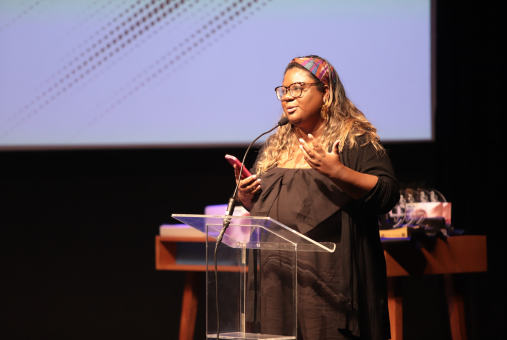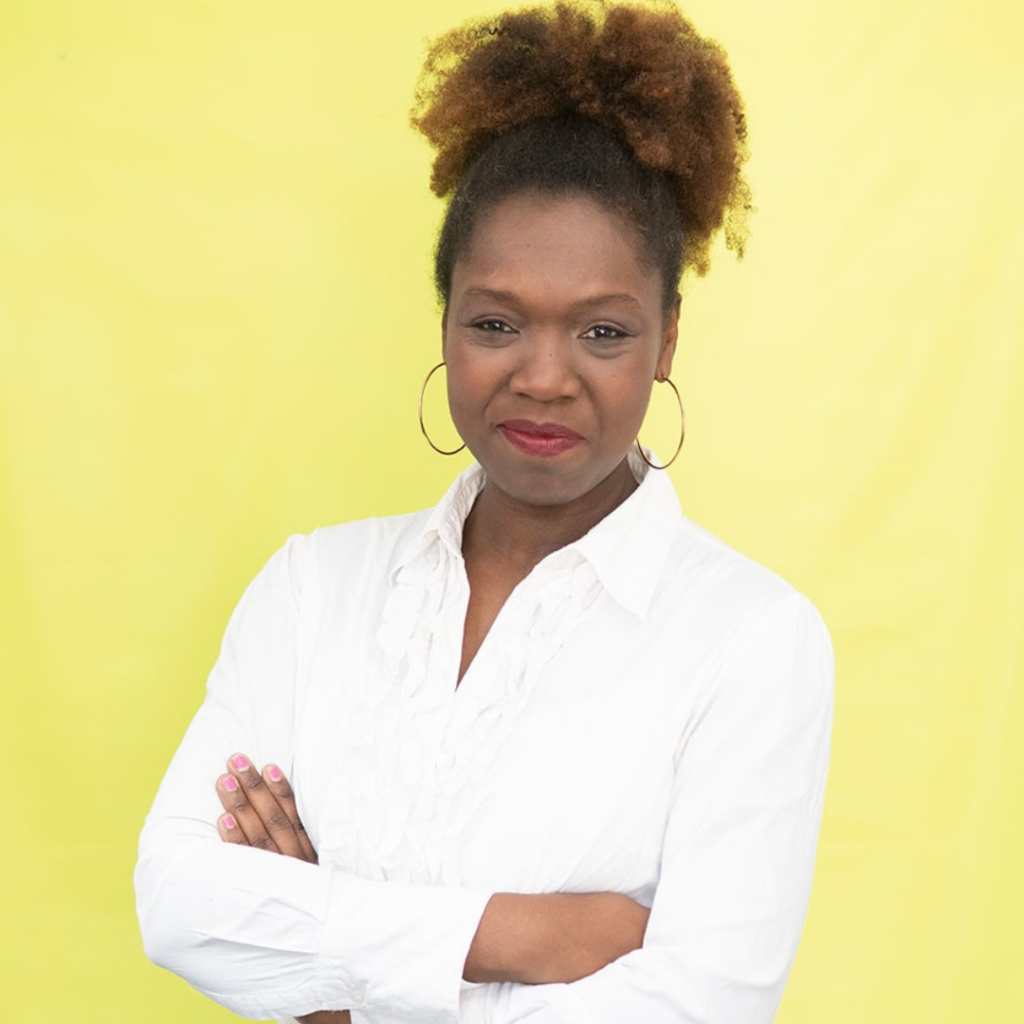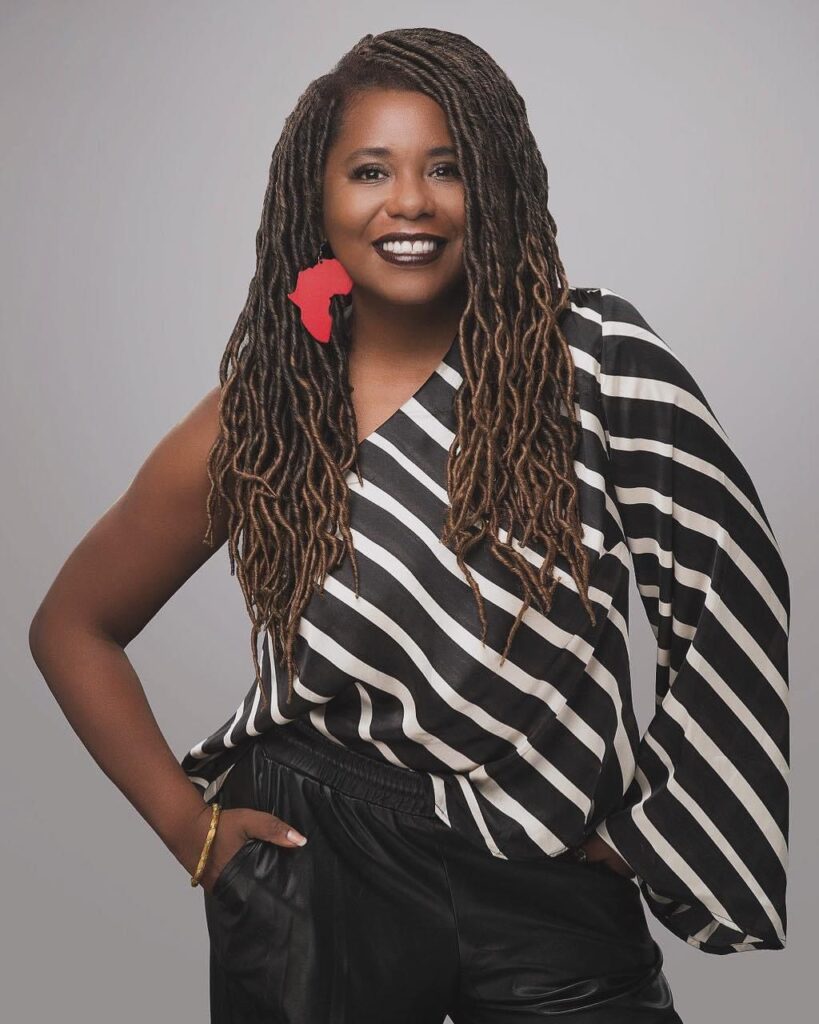One in four people in Latin America identifies as Afro-descendant. In Brazil, where they account for more than half the population (56%, according to the census), they are largely underrepresented in news media. In other countries where they represent smaller proportions of the population, they are practically rendered invisible.
“You turn on the television in Argentina and it seems like you are in Denmark,” Brazilian journalist Denise Mota, columnist at Folha de S.Paulo and editor at Agence France-Press, told LatAm Journalism Review (LJR). She is one of the coordinators and founders of the Network of Afro-Latin Journalists, launched in August to connect and strengthen Black journalists in Latin America.
The regional network is driven by the Network of Black Journalists for Diversity in Communication, founded in 2018 by Brazilian journalist Marcelle Chagas to increase the representation of Black journalists in Brazilian media.

Marcelle Chagas, founder of the Network of Black Journalists for Diversity in Communication and the Network of Afro-Latin Journalists. (Photo: Jurandir Santana)
After holding two International Meetings of Journalists of the African Diaspora, in 2021 and 2022, Chagas said she understood the need to connect journalists from the region, marked by European colonization and the enslavement of African people, to exchange experiences.
“Certain events around the world cross and cut us in the same way,” Chagas, who is also coordinator of the Network of Afro-Latin Journalists, told LJR. “By exchanging experiences, we were able to identify what could be interesting for Brazil, and our experiences could be interesting [for journalists in other countries] as well.”
Mota, who has lived in Uruguay for 19 years, said there is a lack of broader discussions on diversity in media in other Latin American countries. In Brazil, the topic is already gaining some traction.
“In every country, there are organizations [dedicated to this topic], but they haven’t managed to influence media the way they have in Brazil,” Mota said. “We realized there’s not only a gap in organizing this debate in Latin America, but also that Afro journalists in other countries often feel isolated. They either work alone or in very small collectives, whereas in Brazil, there are networks with over 200 people, like the Black Journalists Network.”
Brazil, with its large Black population and advances in this area, has an “objective responsibility” to its neighbors and can contribute by sharing concrete initiatives, Mota added.
The network’s coordinators also aim to connect initiatives across the region and overcome cultural and linguistic barriers.

Denise Mota, one of the founders and coordinators of the Network. (Photo: Courtesy of the Network of Afro-Latin Journalists)
“There are wonderful projects in various countries, but they’re all disconnected,” Mota said. “Colleagues in Peru don’t know what their peers in Mexico are doing. Those in Argentina barely know what’s happening in Uruguay. And Brazil, as a Portuguese-speaking country in a sea of Spanish speakers, is often left out of the discussion.”
One way to foster connections among Afro-Latin journalists and introduce the regional conversation about racial representation in the media is a partnership with El País’s América Futura section, which covers sustainable development in Latin America. Chagas and Mota officially launched the network in August.
Through a form on the network’s website, Afro-Latin journalists can submit articles or story proposals for publication in the section. The network’s coordinators will select submissions, and journalists will be compensated for their work.
“We’re not publishing just because El País is a beautiful showcase,” Mota said. “It’s a partnership like any other, with market-rate payment—not symbolic. It is a showcase, yes, but the goal is to create space to amplify the voices working within their communities and territories.”
Currently, the Network of Afro-Latin Journalists has 13 members from Argentina, Brazil, Colombia, Peru, Uruguay and the Bahamas. The network is open to any Afro-Latin journalist who wishes to join.
Peruvian journalist Sofía Carrillo has been a member since its launch. She hosts Afroraíces, a program that has aired for nearly three years on Peru’s National Radio.
“It was a debt I had in my role as a journalist: to create a space where we could talk about Afro-descendants,” Carrillo told LJR. “And not only from the typical ‘cultural contribution’ perspective but to discuss our contributions in science, political participation, and the anti-racist struggle.”
Racist attacks are a recurring topic among members of the Network of Afro-Latin Journalists, she said, as Black journalists face hostility not only for their content but also for their racial identity.
“Beyond differing opinions from those who attack me, especially on Twitter, there’s a racist aggression that’s extremely painful,” she said. “We really need to feel supported, as we’ve discussed the loneliness that comes with being an Afro-descendant journalist in our countries.”
Carrillo is also known in Peru as a human rights activist. She explained that she sees herself as having an “educational responsibility to teach” about claiming racial identity in communication.

Peruvian journalist Sofía Carrillo. (Photo: Courtesy of Sofía Carrillo)
“We’re not reducing our identity solely to that, because ultimately, we have to recognize that various identities and conditions intersect,” Carrillo said. “It’s a big challenge to engage in this reflection within the journalistic profession from the perspective of Afro-Latin and Afro-Caribbean journalists.”
Carrillo emphasized the importance of amplifying the voices of journalists and sources that are not being heard in the media and of sharing positive stories about Afro-descendant populations in Latin America.
Another member of the network, journalist Deandrea Hamilton, founded her own media outlet to tell stories of “the people who truly build the nation,” she told LJR. Based in Nassau, Bahamas, and Providenciales, Turks and Caicos Islands, Hamilton is the founder and CEO of Magnetic Media, a media company with a news site that produces content for Caribbean TV and radio stations.
Hamilton said the language barrier between English-speaking Caribbean and Spanish-speaking Latin America hinders integration among regional journalists. However, she advocated for overcoming this barrier to strengthen themselves and better inform their audiences about neighboring countries.
For instance, Hamilton said she was “shocked” to learn that the majority of Brazil’s population is Black.
“When I see Brazil on TV, I mostly see lighter-skinned people,” she said. “We need to show our compatriots the real stories of our countries, our heritage and our connections, because we are highly interconnected.”